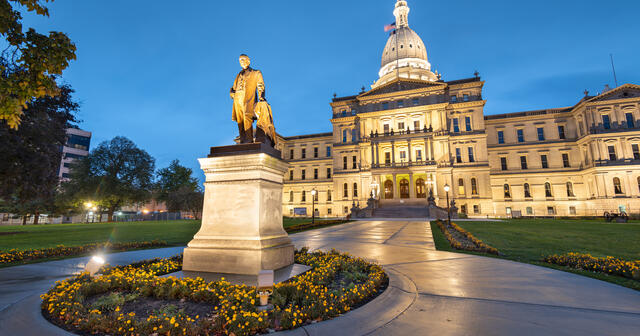

This article originally appeared in The Detroit News May 14, 2024.
My family moved to Michigan almost 12 years ago.
Three months in, my wife and I were driving together. “This feels like … home,” she said.
We moved here with no previous connection to Michigan. In 12 years, we’ve discovered so much to love.
Even with our pre-baked football allegiances, we learned to root for the Lions. I was at Ford Field when Calvin Johnson broke Jerry Rice’s single-season receiving yards record. We are now maniacal hockey fans, cheering on the Saginaw Spirit.
We can recommend restaurants across the state: Legs Inn in Cross Village, Raven Café in Port Huron, Mudgie’s Deli in Detroit, Littlebird in Grand Rapids and Pasong’s Café in Saginaw.
We explored the aged grandeur of Belle Isle. The Detroit Institute of Art moved us. My kids joined a children’s business fair at the Detroit Historical Museum. We rode a Model T at Greenfield Village.
People complain about Michigan roads. We’ve gotten our use out of them. Two of my children drove the Tunnel of Trees while accumulating hours for their driving permits. We traversed the major bridges of Michigan: Ambassador, Blue Water, Mackinac.
We encounter Mackinac Island with childlike delight every visit. We bike the perimeter counterclockwise and stop at the Cannonball Oasis for ice cream. We have a favorite table at the Pink Pony, out on the waterfront deck.
In our family you don’t pass by a used bookstore. Finding John K. King Books in Detroit was a reverential experience. We’ve browsed there and at Falling Rock Bookstore in Munising and many bookstores in between.
Even the people buried in Michigan offer stories. The Russell Kirk Center in Mecosta honors the renowned author. When our children studied abolition, we found Sojourner Truth’s grave in Battle Creek. Son House was an early blues performer, and he rests in Mt. Hazel, just off 7 Mile.
Standing against the wind at Sleeping Bear Dunes. Taking photos of the lighthouses on Lake Michigan. Posing in airplanes at the Air Zoo in Portage. Kayaking around Turnip Rock. Riding the glass-bottom boat tour at Pictured Rocks. Skiing at Caberfae. Hunting for the petroglyphs in the Thumb. Skipping rocks at Copper Harbor. Learning to pronounce “Tahquamenon.”
My three children were not born here. But they all say they’re from Michigan.
We love Michigan.
And yet, that’s not why we moved here. We moved here because of a job offer. All the rest — the people and places we love — were benefits, not drivers, of our decision.
There’s a lot of talk in Lansing about population growth. The latest government commission offers a grab bag of ideas to coax people here. The commission calls for taxpayer-funded child and elder care, free college, down payment incentives, business subsidies, a 13th year of schooling, more mass transit, more neighborhood sidewalks and more parks. Few of these ideas have anything to do with population growth, and policies based on them have failed to drive growth in Michigan or other states.
Hannah Kling, an economist and Mackinac Center scholar, wrote a comprehensive review of the economic research about state population growth. She asked, “Why do some states grow faster than others?” Kling analyzed about 100 peer-reviewed studies and articles to find the answer. The takeaway is simple: States that experience job growth will see population growth as well.
Perhaps policymakers are overthinking the problem.
Instead, they should examine how families actually make decisions about where to live and work.
Permission to reprint this blog post in whole or in part is hereby granted, provided that the author (or authors) and the Mackinac Center for Public Policy are properly cited.
Get insightful commentary and the most reliable research on Michigan issues sent straight to your inbox.

The Mackinac Center for Public Policy is a nonprofit research and educational institute that advances the principles of free markets and limited government. Through our research and education programs, we challenge government overreach and advocate for a free-market approach to public policy that frees people to realize their potential and dreams.
Please consider contributing to our work to advance a freer and more prosperous state.

Donate | About | Blog | Pressroom | Publications | Careers | Site Map | Email Signup | Contact